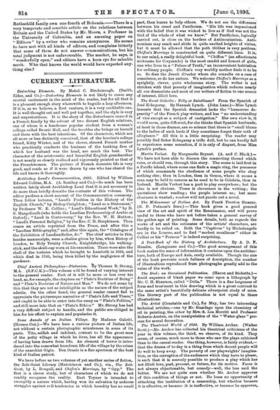We have before us two volumes of yet another series
of fiction, the Zeit-Geist Library (Hutchinson and Co.), viz., The Zeit- Geist, by L. Dougall, and Chiffon's Marriage, by "Gyp." Tho first is a clever study, but of characters of which we do not readily recognise the reality. Bart Toyner is intended to exemplify a nature which, having won its salvation by arduous struggles against evil tendencies in which heredity has no small part, then learns to help others. We do not see the difference between his creed and Pantheism. "Hie life was impassioned with the belief that it was wicked to live as if God was not the God of the whole of what we know." But Pantheism, logically carried out, is close on the borders of Antinomianism. Anti- nomians may reach and abide in quite exalted heights of virtue, but it must be allowed that the path thither is very perilous. Chiffon's Marriage is constructed on quite different lines. It is, to our mind, a really delightful book. `Chiffon" (an affectionate nickname for Corysande) is the most candid and honest of girls, one who lives in a "Palace of Truth," an inconvenient habitation for ordinary people. Chiffon's very worldly mother finds it to be so. So does the Jesuit elL.-ector whom she consults on a case of conscience, so do her suitors. We welcome Chiffon's Marriage as a, sprightly, clever, quite wholesome story. The writer is not stricken with that poverty of imagination which reduces nearly all our dramatists and most of our writers of fiction to one source of interest, illicit love.






































 Previous page
Previous page